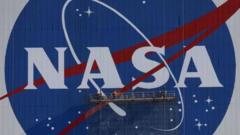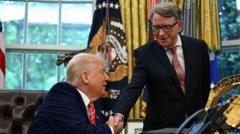Why Did NASA Ban Chinese Nationals from Its Space Programs?

Published: 2025-09-11 10:56:02 | Category: wales
NASA's recent decision to bar Chinese citizens with valid US visas from its facilities marks a significant shift in the agency's approach to international collaboration in space research. This measure is a reaction to heightened security concerns amidst a competitive landscape where China's space ambitions are expanding rapidly.
Last updated: 05 October 2023 (BST)
Key Takeaways
- NASA has restricted access for Chinese nationals, limiting their roles in research and collaboration.
- This move stems from national security concerns amidst a competitive US-China space race.
- Chinese astronauts are already barred from the International Space Station (ISS).
- The US has raised concerns over espionage linked to Chinese nationals in scientific fields.
- Competition extends beyond exploration to control over lunar resources.
Background of NASA's Restrictions
On 5 September 2023, NASA informed Chinese nationals working as contractors or students that they would no longer have access to the agency's facilities, materials, and data systems. The announcement came as a surprise to many, as those affected found their permissions revoked without prior warning. According to reports, this sudden restriction was aimed at safeguarding sensitive information and ensuring the integrity of NASA's operations.
The Underlying Tensions in US-China Relations
The decision to restrict access to Chinese nationals is part of a broader trend of declining scientific collaboration between the US and China. In recent years, the relationship between the two nations has soured, largely due to fears of espionage and competition for technological supremacy. The US government has increasingly scrutinised Chinese scholars, particularly those in science and technology disciplines, making it more difficult for them to secure visas or work in the country.
Impact on Scientific Collaboration
As tensions escalate, opportunities for collaboration in scientific research diminish. NASA's restrictions represent a significant barrier for Chinese researchers who have previously contributed to various projects. This decline in cooperation is particularly notable given the global nature of scientific research, which often thrives on diversity and collaboration across borders.
The Space Race: US vs. China
The competition between the US and China in space exploration is intensifying. Both nations have set ambitious goals for lunar exploration, with China aiming to return to the Moon before the US. According to NASA's acting administrator, Sean Duffy, the notion of a "second space race" is increasingly relevant as both nations push forward with their respective programmes.
China's Space Ambitions
China has made no secret of its aspirations in space. The country's space agency has been rapidly developing its capabilities, from launching crewed missions to establishing a modular space station. These advancements have raised alarms in Washington, leading to a more aggressive stance regarding access to American space facilities for Chinese nationals.
Resources on the Moon: A Strategic Asset
The competition is not solely about exploration; it extends to the control of lunar resources. The Moon is rich in minerals, rare earth elements, and helium, all of which have significant industrial and technological applications. Control over these resources could provide a substantial advantage in future technological developments, making the stakes even higher in this competition.
Concerns Over Espionage
Recent allegations of espionage linked to Chinese nationals in the United States have further strained relations. Instances of Chinese scientists being accused of stealing sensitive information have led to heightened scrutiny and suspicion. This atmosphere of distrust has prompted agencies like NASA to take precautionary measures that affect legitimate researchers and students as well.
Legislative Responses
In response to growing concerns, US lawmakers have emphasised the importance of maintaining a competitive edge in space. During a recent Senate hearing, legislators expressed urgency in ensuring that the US establishes a presence on the Moon before China. Senator Ted Cruz articulated this sentiment, warning that if adversaries gain dominant capabilities in space, it could pose a significant risk to national security.
Future Implications
The latest restrictions may have lasting implications for US-China relations, particularly in the realm of scientific research. The curtailment of access for Chinese nationals could stifle innovation and limit the exchange of ideas that has historically driven advancements in space exploration.
What Lies Ahead for NASA and Chinese Nationals?
As NASA enforces these restrictions, it remains to be seen how this will affect ongoing collaborations and future missions. The agency has yet to clarify how it will manage existing projects involving Chinese researchers or what this means for future partnerships in space exploration.
Conclusion: A New Chapter in Space Exploration
The growing divide between the US and China in space exploration illustrates the complexities of international collaboration in an era marked by competition and security concerns. As both nations seek to advance their capabilities, the implications of these restrictions will continue to unfold, potentially reshaping the landscape of global space research for years to come.
As we witness this evolving dynamic, one must ponder the future of international cooperation in space. Will nations find a way to work together, or will competition drive them further apart? #SpaceRace #NASA #ChinaSpaceProgram
FAQs
Why has NASA restricted access for Chinese nationals?
NASA has imposed restrictions on Chinese nationals to ensure the security of its facilities and data, citing national security concerns amid escalating tensions between the US and China.
What impact does this have on scientific collaboration?
This restriction marks a significant decline in scientific collaboration between the US and China, limiting opportunities for Chinese researchers to contribute to NASA's projects and diminishing global cooperation in space exploration.
What are the implications of the US-China space race?
The implications include potential barriers to collaboration, competition for resources on the Moon, and concerns over national security, which may hinder advancements in space science and technology.
What resources are believed to be on the Moon?
The Moon is believed to contain valuable resources such as rare earth minerals, metals like iron and titanium, and helium, all of which are crucial for various industrial applications.
How has legislator sentiment shaped NASA's decisions?
Lawmakers have expressed urgency in ensuring the US maintains its space superiority, which has influenced NASA's decision to restrict access for Chinese nationals in response to national security concerns.



